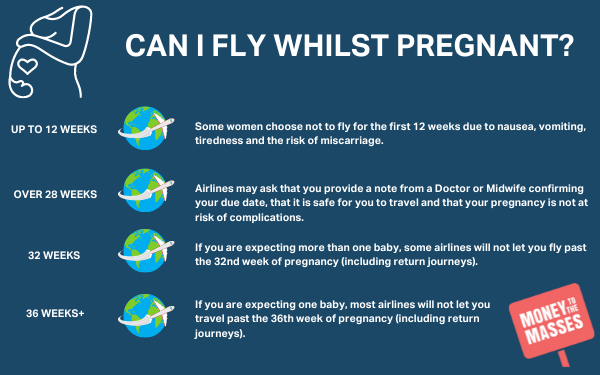Travel insurance is an insurance policy designed to pay out if things go awry whilst you are on holiday. A typical travel insurance policy covers any medical expenses incurred whilst abroad and you may also be able to get cover for lost or stolen belongings or cancellation of your trip. If you are planning to get pregnant or are already pregnant and planning a trip abroad, you may be wondering if you are covered by your travel insurer if you choose to travel.
In this article, we take a look at whether travel insurance covers pregnancy and if there are any restrictions.
Find the right Travel Insurance for you
Our partner Quotezone will compare quotes from up to 35 UK travel insurance providers
Can I travel whilst pregnant?
According to the NHS, travelling whilst pregnant is safe for most women but there may be some restrictions on when you can travel throughout the pregnancy. Tiredness, nausea and vomiting, as well as the risk of miscarriage, can be a reason that some women choose not to travel in the first 12 weeks of pregnancy.
From the 28th week of your pregnancy, airlines may ask for a letter of confirmation from your doctor or midwife confirming your pregnancy is not at risk of complications as well as confirmation of your due date and that you are safe to travel.
In addition, some airlines restrict when you can travel towards the end of your pregnancy due to the risk of childbirth. For example, British Airways does not let pregnant women fly after the 36th week of pregnancy if they are pregnant with one baby and after the 32nd week of pregnancy if they are having multiple babies.
Does travel insurance cover pregnancy?
Pregnancy is not classed as a pre-existing medical condition and is therefore covered by most standard travel insurance policies. A specialist travel insurance policy is not required in order to cover pregnancy. It is also unlikely that you will have to declare that you are pregnant to the insurer and the cost of cover should not change just because you are pregnant. Some travel insurance providers may have some restrictions on what they cover for pregnancy-related claims and we go into more detail about what travel insurance for pregnancy covers further down in this article.
Do I need to declare pregnancy to my travel insurer?
As pregnancy is not classed as a pre-existing condition, you do not have to declare it to your insurer. However, if you have developed any pregnancy-related medical conditions such as gestational diabetes or high blood pressure, it is important that you notify your insurer as not doing so could result in claims not being paid.
Can I cancel my trip if I no longer want to travel due to pregnancy?
If you find out that you are pregnant after booking a trip away, you may not be covered if you wish to cancel your trip, unless your doctor or a health professional has advised against travel. In this instance, it would be best to contact your travel insurance provider to see exactly what pregnancy travel insurance cover you have.
What does pregnancy travel insurance cover?
Most standard travel insurance policies cover pregnancy so you can expect to receive the same level of cover as if you are not pregnant. How much cover you have does vary between providers though but it usually includes emergency medical cover, repatriation, lost or stolen baggage claims, delays and cancellation. If you are pregnant whilst travelling and not travelling against medical advice, you can also expect to be covered for any pregnancy complications that may occur whilst you are abroad which may also include premature birth.
Some insurers may also cover you for the cancellation of your trip if you are unable to travel due to pregnancy or childbirth complications. For example, Admiral travel insurance extends its cancellation cover to include trip cancellation because you, a close relative, travel companion or someone you were due to stay with has experienced complications of pregnancy and childbirth.
It is worth noting that you will not be covered by most travel insurance providers for routine maternity care. Some providers will also not cover medical expenses if you give birth naturally whilst abroad within 8 weeks of your expected due date and experience no complications. For example, Admiral says 'There's no cover for the costs of natural labour and childbirth after 32 weeks, or 24 weeks in the case of twins or multiples'. You will also not be able to get cover if you are travelling whilst pregnant against medical advice. However, it is worth remembering that if you have a Global Health Insurance Card (more info below) you will be able to get maternity care if you are travelling within Europe.
Things to consider before flying whilst pregnant
Whilst travelling when pregnant does not affect your travel insurance policy, there are some things you should consider before going away and we cover these in more detail below.
Travel destination
Before you travel whilst pregnant, you will need to consider the destination you are hoping to travel to. Some destinations have an increased risk of diseases such as malaria and you are encouraged to avoid travelling to these areas whilst you are pregnant. It is also recommended that you avoid areas that increase your risk of catching the Zika Virus.
Whilst it is better to avoid areas that require vaccinations, sometimes this is not possible. If you do have to travel to a destination where you need to get a vaccination, you will need to check with your doctor first to see if it is safe to do so. According to the NHS website, "Some live travel vaccines may be considered during pregnancy if the risk of infection outweighs the risk of live vaccination. Ask your GP or midwife for advice about specific travel vaccinations. Non-live (inactivated) vaccines are safe to use in pregnancy."
Deep Vein Thrombosis (DVT)
Flying increases the risk of DVT due to being seated for long periods of time. Deep Vein Thrombosis is a blood clot in the vein which usually occurs in the lower leg. If you travel whilst pregnant it is better to keep moving and remain hydrated to reduce the risk of getting DVT. You can also choose to wear in-flight compression stockings to help reduce the risk.
GHIC (Global Health Insurance Card)
If you are travelling to Europe, it is advisable to have a Global Health Insurance Card, which replaces the old EHIC, in addition to a travel insurance policy. If you still have an EHIC, this is still valid until its date of expiry. The GHIC provides access to healthcare in European countries if you have a medical problem that cannot wait until you return to the UK. A GHIC can also help to provide routine maternity care as long as you have not planned to give birth outside of the UK and the care cannot wait until you return to the UK. It is important to note, however, that the GHIC does not replace a travel insurance policy so travel insurance is required if you wish to cover trip cancellation and lost or stolen baggage as well as emergency medical expenses and repatriation.
How to buy travel insurance that covers pregnancy
Buying a travel insurance policy that covers pregnancy is relatively easy as most travel insurance providers cover pregnancy as standard as it is not classed as a medical condition. When purchasing a travel insurance policy it is imperative that you check your policy documents carefully so you know exactly how much you are covered for and if there are any pregnancy-related exclusions in your cover.
The quickest and easiest way to look for a travel insurance policy is via a comparison site such as Quotezone* or MoneySuperMarket* as each compares insurance from multiple providers at once. Although it is worth bearing in mind that comparison sites are not always whole of market so you may get a better deal elsewhere. We also compare some of the top providers in our article, 'Best travel insurance providers in the UK'.
If you have an existing annual travel insurance policy and have since fallen pregnant, it may be worth contacting your travel insurance provider to check that you are still covered.
If a link has an * beside it this means that it is an affiliated link. If you go via the link, Money to the Masses may receive a small fee which helps keep Money to the Masses free to use. The following link can be used if you do not wish to help Money to the Masses or take advantage of any exclusive offers -MoneySuperMarket, Quotezone






